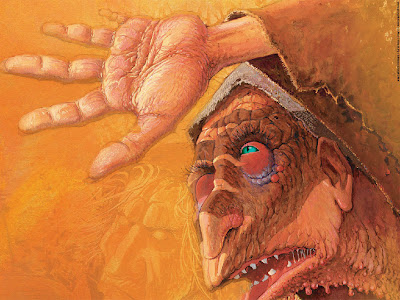24.6.05
Imago Dei
It is only through the psyche that we can establish that God acts upon us, but we are unable to distinguish whether God and the unconscious are two different entities.
Both are border line concepts for transcendental contents.
But empirically it can be established, with a sufficient degree of probability, that there is in the unconscious an archetype of wholeness which manifests itself spontaneously in dreams, and a tendency, independent of the conscious will, to relate other archetypes to this centre.
Consequently, it does not seem improbable that the archetype produces a symbolism which has always characterised and expressed the Deity.
The God-image does not coincide with the unconscious as such, but with a special content of it, namely the archetype of the Self.
It is this archetype from which we can no longer distinguish the God-image empirically.
One can, then, explain the God-image… as a reflection of the Self, or, conversely, explain the Self as an Imago Dei in man.
Carl Gustav Jung, Psychology and Religion: West and East (Coll. Works, vol II, page 468)
O termo surge entre os primeiros filósofos da Igreja, segundo os quais a “imago Dei” está impressa na alma humana.
Quando essa imagem é produzida espontaneamente em sonhos ou visões, do ponto de vista psicológico corresponde a uma imagem reflexa do Self de Jung, isto é do Absoluto psíquico.
Etiquetas: jung, psicologia, religião
Comments:
<< Home
Independentemente de outras apreciações, aquilo que aprecio no Jung é sobretudo a sua capacidade de ir buscar e ler os nossos arquétipos.
Boa noite, CBS, e obrigado por mo ir recordando.
Boa noite, CBS, e obrigado por mo ir recordando.
E a maior descoberta, caro Csa:
O inconsciente colectivo.
Se Freud e ele tivessem continuado juntos...
Dois gigantes que nós prezamos pouco, e em especial Jung.
Enviar um comentário
O inconsciente colectivo.
Se Freud e ele tivessem continuado juntos...
Dois gigantes que nós prezamos pouco, e em especial Jung.
<< Home


